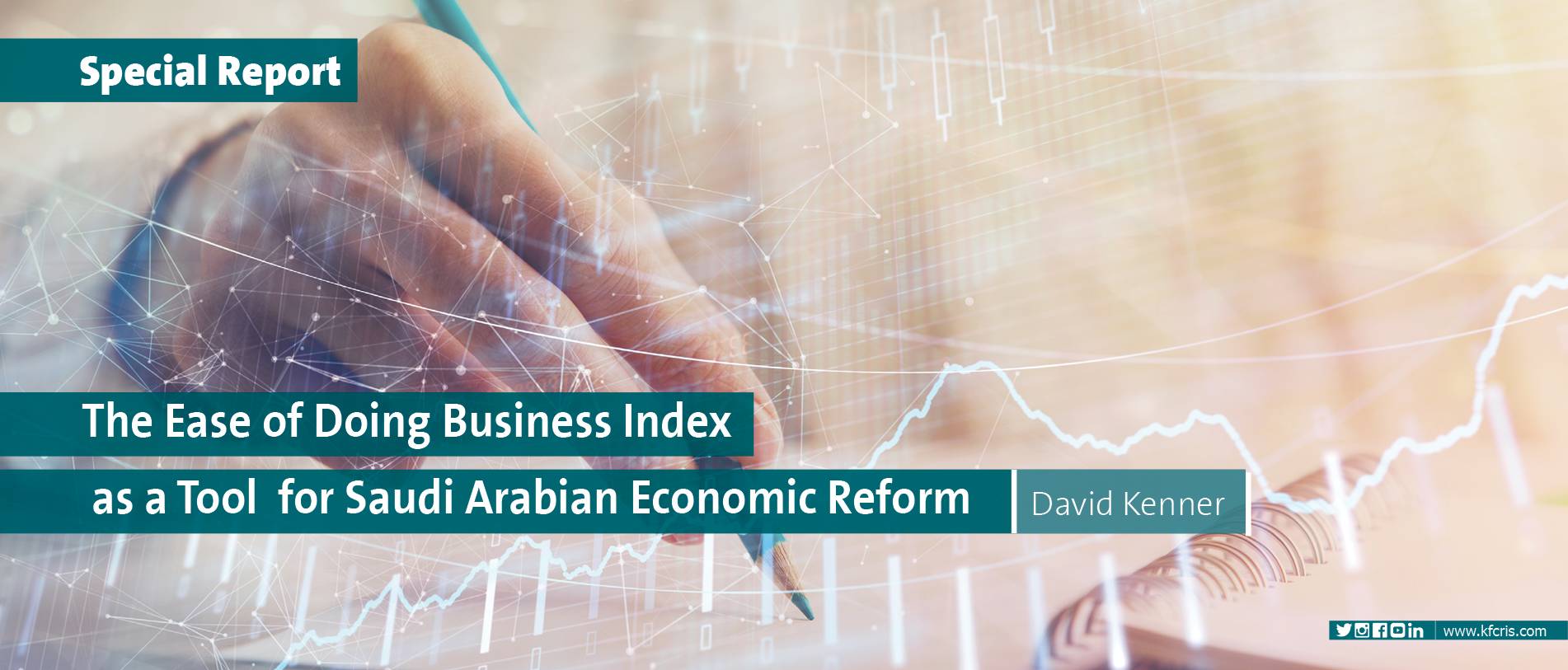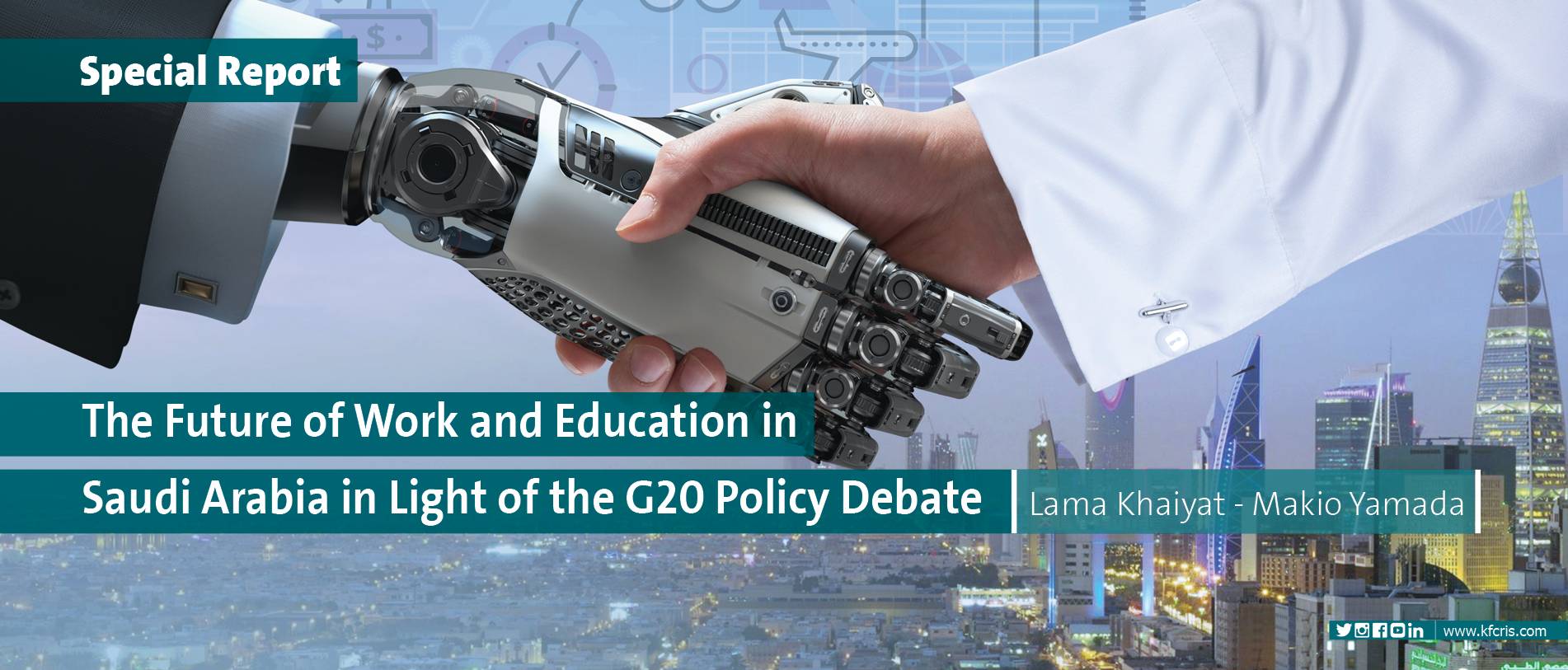Special Reports

Number:
Author: David Kenner
The World Bank’s Ease of Doing Business index is one of the most widely used global metrics
for assessing a country’s regulatory performance. Saudi officials have frequently employed it to

Number:
Author: Lama Khaiyat and Makio Yamada
With the latest technological changes such as the fourth Industrial Revolution and a new wave of automation, the “future of work and education” has been a major point of discussion around the world. It was also one of the key items on the agenda of the G20, which took place in Japan this year and will be hosted by Saudi Arabia in 2020. The T20 (Think20), an intellectual backbone of the G20, has been running a task force dedicated to this issue, where thinkers and researchers from its member states meet to discuss ways to address challenges posed to individuals, businesses, and governments in the digital age.
Number:
Author: Abdulmajeed Saud Mangrah
For all such a various array of events in the Middle East, there is one title: a scramble toward forging a new regional system after two competing models. One model seeks a regional system that rests on sovereign nation-states, whereas the other envisions a hybrid regional system composed of weaker states linked with sub-state actors performing state functions in the regional balance of power. While Saudi Arabia’s foreign policy falls into the former model, Iran’s foreign policy is informed by the latter. Each of them is driven by specific perceptions and structural imperatives to adopt their respective model.
Number:
Author: Kamal Mohammed Jah Allah Alkhadr
The mass movement in Sudan, which dates back to 19 December 2018, carried the element of pure surprise and absolute astonishment, despite the fact that this uprising is the natural product of accumulated factors, historical and economic.
This study is divided into three parts, preceded by an introduction. The first part deals with the geography of the uprising in terms of the causes and trends of the events as well as the range of mobilization. The second part outlines the central actors/players in the Sudanese mobilization. The third part illustrates the stance of the Sudanese military from the upri
Number:
Author: Uhoud Al Lami
The article focuses on narrating how historically political attention has been gradating toward climate change issues, how the issue of climate change, weather research, the study of climate change drivers, and ways to reduce the emissions of climate change have stepped out from the scientific field, collided with politics and conflict of interest of economic nations, and how new blocs may be formed to address this issue, which poses a real threat to the environment, the safety of the planet and future generations, from which no state is excluded. On the other hand, it has become a tool of political pressure and a new dispute, as states have begun to p
Number:
Author: Mark C. Thompson
Saudi Vision 2030 aims to involve the national citizenry as motivated stakeholders in the Kingdom’s transition to a knowledge-based economy. In doing so, it recognizes the need to inculcate up-to-date skills sets among young nationals. Nevertheless, today, the types of knowledge and skills required in the economy are rapidly changing, driven by the so-called Fourth Industrial Revolution. “The Future of Jobs Report 2018,” a report published by the World Economic Forum (WEF) in September 2018, for instance, underscores the need for a comprehensive workforce strategy to meet the challenges of accelerating change and innovation. Likewise,
Number:
Author: Sebastian Maier and Yousef Zarea
Recently, the armed conflict in Syria has witnessed an increasing political, military, and operational role of two of the conflict’s major stakeholders: Turkey and the United States. The implications of Washington’s and Ankara’s evolving foreign and security policies vis-à-vis Syria showcase how the connotation of foreign interference has become a synonym for the intractable reality on the ground, making inclusive, tangible diplomatic compromise a daunting task. Accordingly, the paper will first outline the growing role of Turkey’s political and military engagement and its ambivalent effect on the inter
Number:
Author:
Faris Al-Sulayman
Large fiscal deficits brought about by the precipitous decline in oil prices in late 2014 and long-standing challenges concerning youth unemployment have been two of the dominant underlying themes driving economic policy in Saudi Arabia in recent years. These challenges, though not unique in the region, loom particularly large when compared to those of some of the Kingdom’s “super-rentier” neighbors, and they have engendered a sense of urgency at the policy-making level.
These trends have also formed the backdrop
Number:
Author:
Steffen Hertog
Among all the economic challenges on the road to Vision 2030, job creation for Saudi citizens is the politically most important one—and after an initial focus on other Vision-related policy areas, it is increasingly taking center stage in the kingdom’s economic policy debate. However, a formula to guarantee sufficient, sustainable jobs for Saudi citizens is still missing: The Nitaqat employment-quota system has created significant employment since its introduction in 2011, but it has also imposed significant costs on business, and many of the Nitaqat-induced jobs appear to
Number:
Author:
Dr. Mohammed Al-Sbitli
The African Horn has recently witnessed a regional movement that ends the two decades of conflict between the countries of the region and the emergence of alliances in the context of border disputes and historical differences inherited from the colonial era, represented by ethnic diversity and international and regional conflicts in East Africa and the Red Sea. In a short period of time, the African Horn has shifted from one of the most tense regions of the continent to a model territory in the search for historic reconciliations and settlements.
